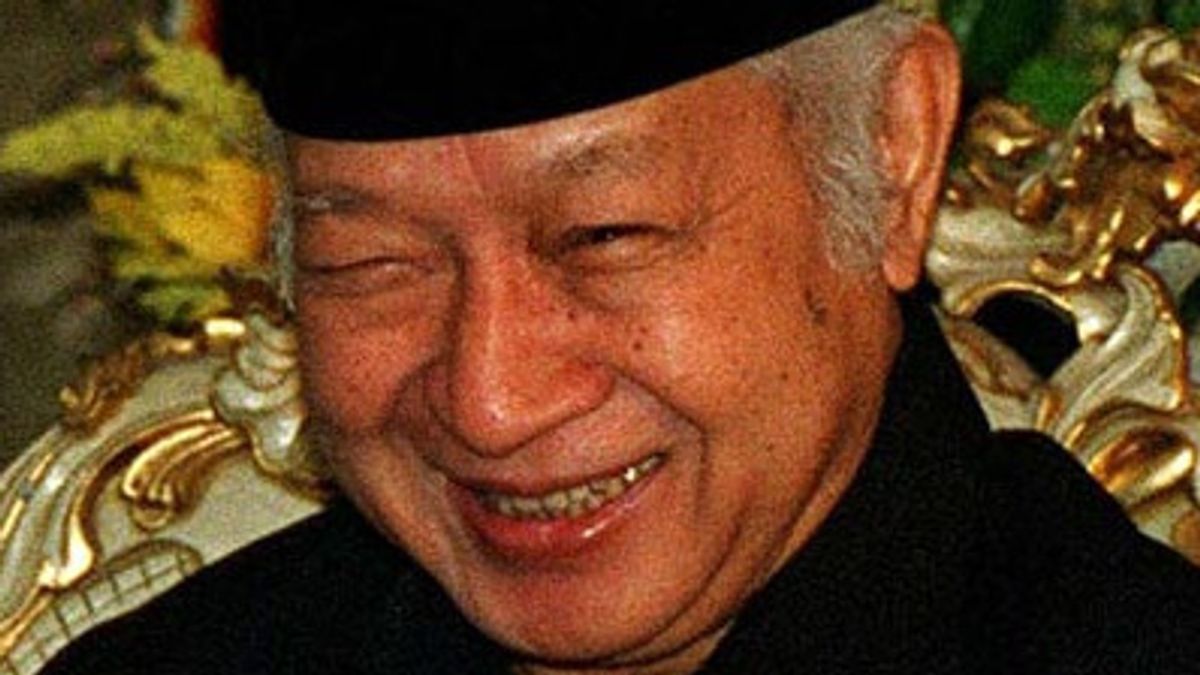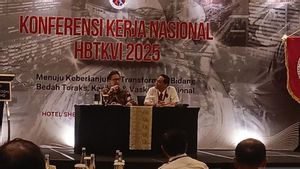JAKARTA - The identity card (KTP) project is one of the most 'wet'. Many entrepreneurs are fighting over the ID card project. Even since the New Order era (Orba). The Suharto family, who was in power at that time, did not pass. Children and in-laws follow. One of them managed to monopolize the national ID card project.
The winner of the tender is not only about the blessing of The Smiling General. The most vital thing is actually lobbying the officials. Suharto's son-in-law, Elsje Sigit, who incidentally was Sigit Harjojujanto's wife, succeeded. His company excels at monopolizing projects.
Perhaps one of the most memorable things from the New Order was the ease with which the Cendana family had access to large funds. The Cendana children's business continues to thrive. They penetrated almost all lines of business.
Property, telecommunications, banking, hospitality, automotive, electricity, oil, chemical, entertainment and toll roads are Cendana's business fields. So special that all banks, especially state banks are so generous in lending. No one cares how big the risk.
Suharto's own attitude was actually neutral. He does not forbid or zealously recommend his children to his son-in-law to do business and pursue government projects. Suharto even once gave a message to public officials, if their children-in-law do not meet the qualifications, then don't win.
Otherwise. If the children are indeed superior, then do not be defeated. Suharto was of the view that there was nothing wrong with his son-in-law's steps in doing business. As long as you follow the rules. But Suharto's big name was too special.

“Whatever comes from sandalwood, let alone the word of command or request, even the glance of desire, everything acts like destiny: it is forbidden to refuse, it cannot be rejected. Besides being powerful as destiny, Cendana is also a magic key, a chant that can open all the doors of regulation in Indonesia. Legal, not legal, not so important. Everything can be arranged,” was written in a Tempo Magazine report entitled Footprints of Cendana Children (2003).
"Who can import cars without tax if not Tommy Suharto. Who can own a satellite other than the company owned by Bambang Trihatmodjo. Who can build toll roads except Siti Hardijanti Rukmana (Mbak Tutut). In short, the authority and scope of business of Cendana's subsidiaries is similar to that of a state company. The only difference is this: state companies are owned by the people, Cendana companies are controlled by Suharto's children,” the report added.
This privilege is often practiced systematically. Sometimes it's sporadic. Often, the Cendana families fight over projects. In the Cawang-Tanjung Priok toll road project, for example. Long before the inauguration in 1990, there were four companies that participated in the tender.
The most representative are only two companies. The companies belong to Prince Cendana, Tommy Suharto, and Putri Cendana, Mbak Tutut, respectively. The presence of Suharto's children in the struggle for the toll road project troubled the Minister of Public Development, Suyono Sosrodarsono, who served from 1983-1988.
He even formed a special team so he wouldn't make the wrong choice. The one thing he avoided the most was Suharto's wrath. Moreover, a memo from the Father of Development can break all the rules.
Finally, the decision came out. Mbak Tutut's company was chosen as the winner of the tender. After that, Suyono went to Cendana to explain about the selection of Mbak Tutut's company.
ID card creation and computerization projectCompetition for another big project in the style of the Cendana family had also occurred in the project of making and computerizing ID cards. Tommy Suharto and his team visited the Minister of Home Affairs Rubini, who served from 1988-1993.
Tommy's arrival was aimed at requesting a national ID card project. Tommy promotes the excellence of his concept, which allows anyone to renew their ID card anywhere.
After hearing Tommy's idea, Rubini actually agreed. However, Rubini was a little skeptical of Tommy's idea. He then asked about how the procurement of computer equipment.
Tommy explained that for procurement, the government would collect a two-dollar levy for every foreign tourist visiting Indonesia. When funds are collected, computer equipment can be purchased.
Rudini refused to give the project to Tommy. The reason Rudini Indonesia at that time was trying to increase the number of foreign tourist visits. If tourists have to pay a two-dollar levy without any legal basis, it could disrupt the flow of their arrival. Moreover, Rudini realized that foreign tourists are known to be skeptical.
“Not long after Tommy's visit, Rudini reported to the President. He explained everything, aside from expressing his disapproval. Apparently, Suharto, according to Rudini, could understand his argument. Suharto said: Yes, I have. It can't be. So, the project for computerizing ID cards was canceled at that time," wrote Tjipta Lesmana in the book From Soekarno to SBY (2013).
After Tommy, another sandalwood family, Elsje Sigit advanced for the national ID card project. Suharto's son-in-law from his second child, Sigit Harjojujanto was able to convince the Ministry of Home Affairs to give the ID card project to his company, PT Solusindo Mitra Sejati (SMS).
Elsje Sigit's plan became more feasible because the position of Minister of Foreign Affairs was filled by a new person, Yogie Suardi Memet (1993-1998). This has an effect on foreign policy. Besides that, another reason is said to be because of Elsje Sigit's beautiful lobbies.
Quoting Kompas.com, the cooperation agreement letter between the Ministry of Home Affairs (Depdagri) and PT SMS was signed on February 27, 1993. As a result, many parties in the Ministry of Home Affairs made a fuss over the granting of the project because they were not involved.
As a result, the project was traced back. Although disturbed, the project is still running because it has the support of many parties. As a solution to procuring computerized ID cards, the government is proposed to increase the costs of making ID cards and other securities.
Other securities referred to are family cards (KK), certificates of birth, death, transfer, and residence permits for foreigners, with the amount of 100 -350 percent. This amount is comparable to the multiplied profit from the monopoly of the national ID card project that will be obtained by Elsje Sigit and his partners.
“At that time, the KTP of Indonesian citizens will increase from Rp. 1,000 to Rp. 3,000, the KTP of foreigners from Rp. 2,000 to Rp. 5,000, while the family card of Indonesian citizens will increase from Rp. 500 to Rp. 1,500 and the family card of foreigners from Rp. 1,000 to Rp. 2,000. The increase in levies for making ID cards, family cards and certificates of birth, death, moving in the DKI Jakarta area, is proposed to increase between 100 percent and 350 percent after the private sector, PT Solusindo Mitra Sejati (SMS), a consultant for the Ministry of Home Affairs, becomes the manager of the population management system. simduk) nationally,” reads a Kompas Daily report entitled KTP Fees Proposed to Increase to Rp3,000 (1995).
* Read other information about SOEHARTO or read other interesting articles from Detha Arya Tifada
Other MEMORIESThe English, Chinese, Japanese, Arabic, and French versions are automatically generated by the AI. So there may still be inaccuracies in translating, please always see Indonesian as our main language. (system supported by DigitalSiber.id)












